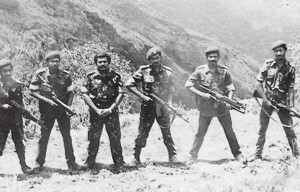India’s undue interference despite past and current failures
Posted on March 2nd, 2020
S. Akurugoda
According to the latest media reports, ethnic violence in India’s capital has left more than 40 dead and hundreds injured after a Hindu nationalist rampage, stoked by the rhetoric of Narendra Modi’s populist government.
Violence has been a stain on India’s history since partition in 1947 when Pakistan was formed as a separate Muslim state and up to two million people died in the fighting and its aftermath. Riots have continued to erupt along religious lines in a country where around 14% of the population is Muslim, with an 80% Hindu majority.
When the BJP was elected to government in 2014, led by Prime Minister Modi, divisions widened. Even before he became PM, Modi’s reputation had been tainted by hatred and violence. As chief minister of Gujarat, he had been accused of encouraging sectarian riots in 2002 that left more than 1,000 people dead, 800 of them Muslims. Modi denies the charges, which resulted in him being banned from the US.
The above ethnoreligious riots are a clear indication of the failure of the Indian Prime Minister Narendra Modi to practice what he preaches to Sri Lankan leaders eloquently.
As we are aware, Indian PM has raised the issues of reconciliation, aspirations, equality, justice, peace, and dignity of the Sri Lankan Tamil community and the necessity of the implementation of the 13th Amendment to the Constitution of Sri Lanka when Prime Minister Mahinda Rajapaksa visited India last month. Indian PM raised the same ‘concerns’ with President Gotabhaya Rajapakse too when he visited India last November. The above ‘concerns’ of India appear that some quarters of the central government of India are still in confusion over its territories, despite its past misdeeds and failures.
India became the first country, since independence, to interfere with the internal affairs of Sri Lanka openly in the 1980s and the resulted Indo-Lanka Pact of 1987; IPKF, etc were nothing but gross violations of the internal affairs of Sri Lanka. India had to pay a heavy price later.
It is a well-known fact that India’s spy agency RAW provided arms, training and monetary support to six Sri Lankan Tamil terrorist groups including the LTTE and their leaders during the period 1983-87. The idea was that the Sri Lankan Tamils after being trained and armed would be sent back to northern Sri Lanka to engage the Sri Lankan troops in guerrilla warfare.

Image from left: Lingam(Prabhakaran’s bodyguard), Aruna (Batticaloa commander), Prabhakaran (LTTE chief), Pulendiran (Triconmalee commander), Victor (Mannar commander), Bottu Amman (chief of intelligence).
Karuna Amman’s declaration later that he himself received training in India and how his training contributed to the war in Sri Lanka is a clear indication of the perpetrators of the problem.
Those who blindly parroting the words the implementation of the 13th Amendment” appear to have forgotten the background against which the 13th Amendment to the Constitution, forced on us as a result of Indo-Lanka pact, and most of them may not be aware of what really is in it since the Indo-Lanka pact was signed over three decades ago.
Those who promote its implementation argue that the Amendment already exists and what is needed is implementation. The repercussion we are experiencing today as a result of the controversial, ill-fated, ill-defined and hastily prepared 19th Amendment to the Constitution is a minor case in point of attempting to implement anything, just because it is in the constitution, compared to the disastrous consequences that could be expected by devolving power on ethnic lines as stipulated in the 13th Amendment.
The 13th Amendment to the Constitution drafted by the Indian Civil servants, influenced by the Indian Quasi- Federal system, was certainly ill-conceived and hurriedly pieced together by picking bits and pieces of the Indian Constitution in keeping with the Indo-Lanka Accord and hence was not practicable. http://www.asiantribune.com/?q=node/18301
Prior to the signing of the 13th Amendment, there had been a belief that the ‘Official language policy” of 1956 was the root cause of the conflict. The 13th Amendment made Tamil an official language overnight as a solution but the charges against discrimination and demand for self-determination continue to be made based on those lines. If the official language is the root cause, the conflict would have resolved itself with the implementation of the 13th Amendment language policy.
Although the Indian government undertook to disarm the terrorist group in return for implementing the constitutional amendment imposed on the Sri Lanka government, India failed miserably to fulfill its obligation as per the agreement. On the other hand, Sri Lankan people had to bear the huge cost of war against terror and the cost of implementing the constitution amendment, thus imposed under the failed agreement, in addition to the loss of lives since 1987. Since it is the Sri Lankan Security forces who ultimately disarm the terrorists, the moral rights of the Indian government to ask the government of Sri Lanka to implement the 13th amendment is highly questionable.
On the other hand, the basic question we have is what it makes us believe that the 13th Amendment based on Indian devolution model is ideal for Sri Lanka when India’s quasi-federal model itself has failed to address the issues of safety, aspirations, equality, justice, peace, and dignity of its own communities.
S. Akurugoda